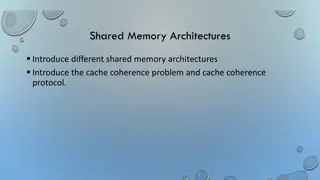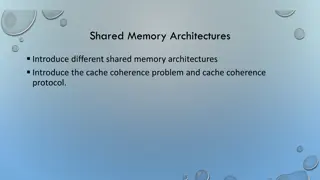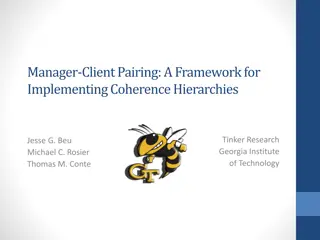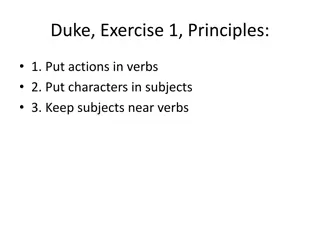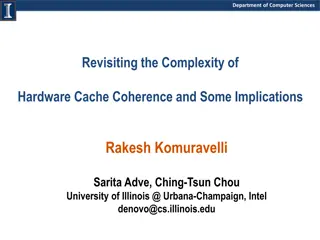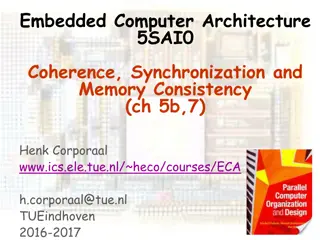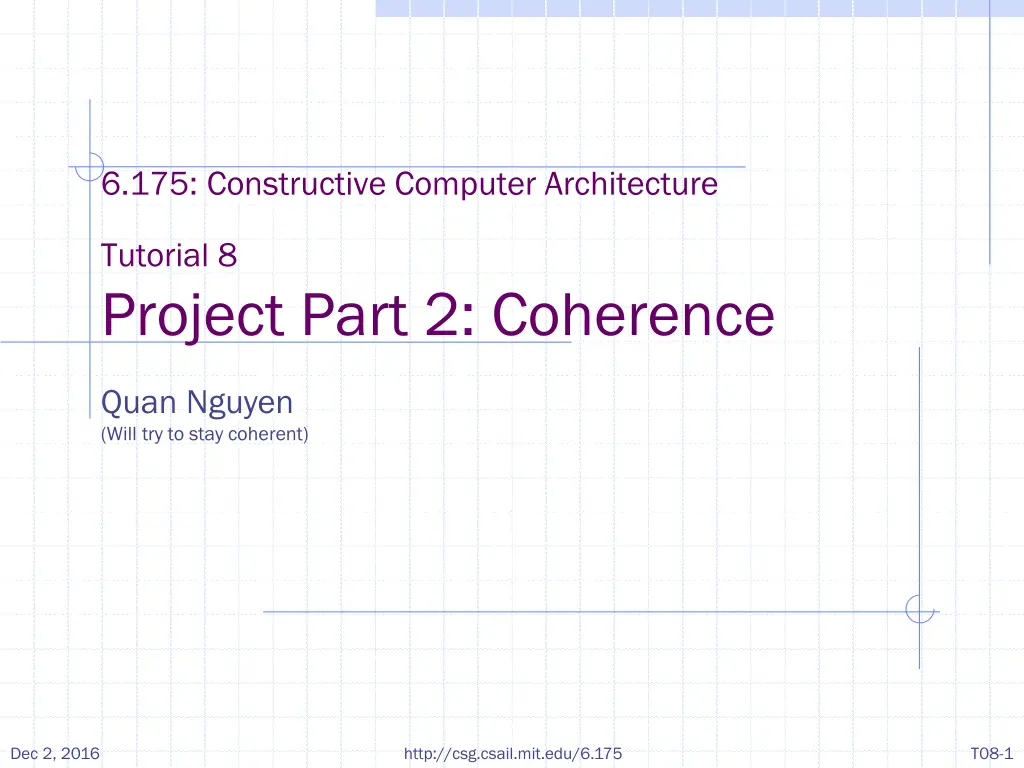
Constructive Computer Architecture Tutorial Projects Coherence Debugging Techniques
Explore coherence and debugging techniques in Constructive Computer Architecture Tutorial Projects. Learn about addressing schemes, debugging deficiencies, and adding sanity checks to enhance project efficiency.
Download Presentation

Please find below an Image/Link to download the presentation.
The content on the website is provided AS IS for your information and personal use only. It may not be sold, licensed, or shared on other websites without obtaining consent from the author. If you encounter any issues during the download, it is possible that the publisher has removed the file from their server.
You are allowed to download the files provided on this website for personal or commercial use, subject to the condition that they are used lawfully. All files are the property of their respective owners.
The content on the website is provided AS IS for your information and personal use only. It may not be sold, licensed, or shared on other websites without obtaining consent from the author.
E N D
Presentation Transcript
6.175: Constructive Computer Architecture Tutorial 8 Project Part 2: Coherence Quan Nguyen (Will try to stay coherent) Dec 2, 2016 http://csg.csail.mit.edu/6.175 T08-1
Debugging Techniques Deficiency about $display() Everything shows up together Distinct log file for each module: write to file Also see src/unit_test/sc-test/Tb.bsv Ehr#(2, File) file <- mkEhr(InvalidFile); Reg#(Bool) opened <- mkReg(False); rule doOpenFile(!opened); let f <- $fopen("a.txt", "w"); if (f == InvalidFile) $finish; file[0] <= f; opened <= True; endrule Writing to InvalidFile will cause segfault. Use EHR if the logic will call $fwrite() in the first cycle rule doPrint; $fwrite(file[1], "Hello world\n"); endrule Dec 2, 2016 http://csg.csail.mit.edu/6.175 T08-2
Debugging Techniques Deficiency about cycle counter Rule for printing cycle may be scheduled before/after the rule we are interested in Don t want to create a counter in each module Use simulation time $display( %t: evict cache line , $time); $time() returns Bit#(64) representing time In SceMi simulation, $time() outputs: 10, 30, ... Dec 2, 2016 http://csg.csail.mit.edu/6.175 T08-3
Debugging Techniques Add sanity checks Example 1 Parent is handling upgrade request No other child has incompatible state Parent decides to send upgrade response Check: parent is not waiting for any child (waitc) Example 2 D$ receives upgrade response from memory Check: must be in WaitFillResp state Process the upgrade response Check: if in I state, then data in response must be valid, otherwise data must be invalid (data field is Maybe type in the lab) Dec 2, 2016 http://csg.csail.mit.edu/6.175 T08-4
Coherence Protocol: Differences From Lecture In lecture: address type for byte address Implementation: only uses cache line address (addr >> 6) for 64-byte cache line In lecture: parent reads data in zero cycles Implementation: read from memory, long latency In lecture: voluntary downgrade rule No need in implementation In lecture: Parent directory tracks states for all address 32-bit address space huge directory Implementation: usually parent is an L2 cache, so only track address in L2 cache But we don t have an L2 cache Dec 2, 2016 http://csg.csail.mit.edu/6.175 T08-5
Coherence Protocol: Differences From Lecture Workaround for large directory For each child, only tracks addresses in its L1 D$ Vector#(CoreNum, Vector#(CacheRows, Reg#(CacheTag))) tags <- replicateM(replicateM(mkRegU)); Vector#(CoreNum, Vector#(CacheRows, Reg#(MSI)) states <- replicateM(replicateM(mkReg(I))); To get MSI state for address a in core i MSI s = tags[i][getIndex(a)] == getTag(a) ? states[i][getIndex(a)] : I; Dec 2, 2016 http://csg.csail.mit.edu/6.175 T08-6
Load-Reserve (lr.w) and Store- Conditional (sc.w) New state in D$ Reg#(Maybe#(CacheLineAddr)) la <- mkReg(Invalid); Cache line address reserved by lr.w Load-reserved: lr.w rd, 0(rs1) rd <= mem[rs1] Make reservation: la <= Valid(getLineAddr(rs1)); Store-conditional: sc.w rd, rs2, 0(rs1) Check la: lainvalid or addresses don t match: rd <= 1 Otherwise: get exclusive permission (upgrade to M) Check la again If address match: mem[rs1] <= rs2; rd <= 0 Otherwise: rd <= 1 If cache hit, no need to check again (address already match) Always clear reservation: la <= Invalid http://csg.csail.mit.edu/6.175 Dec 2, 2016 T08-7
Load-Reserve (lr.w) and Store- Conditional (sc.w) Cache line eviction Due to replacement, invalidation request ... May lose track of reserved cache line Then clear reservation Compare evicted cache line with la If match: la <= invalid This is how an LR/SC pair ensures atomicity Dec 2, 2016 http://csg.csail.mit.edu/6.175 T08-8
Reference Memory Model Debug interface returned by reference model is passed into every D$ interface RefDMem; method Action issue(MemReq req); method Action commit(MemReq req, Maybe#(CacheLine) line, Maybe#(MemResp) resp); endinterface module mkDCache#(CoreID id)( MessageGet fromMem, MessagePut toMem, RefDMem refDMem, DCache ifc); D$ calls the into debug interface refDMem Reference model will for coherence violations Reference model: src/ref Dec 2, 2016 http://csg.csail.mit.edu/6.175 T08-9
Reference Memory Model issue(MemReqreq) Called when req issued to D$ in req() method of D$ Give program order to reference model commit(MemReq req, Maybe#(CacheLine) line, Maybe#(MemResp) resp); Called when req() finishes processing (commit) line: cache line accessed by req, set to Invalid if unknown resp: response to the core, set to Invalid if no repsonse When commit() is called, reference model checks whether: req can be committed line value is correct (not checked if Invalid) resp is correct Dec 2, 2016 http://csg.csail.mit.edu/6.175 T08-10
Adding Store Queue New behavior for memory requests Ld: can start processing when store queue is not empty St: enqueue to store queue Lr, Sc: wait for store queue to be empty Fence: wait for all previous requests to commit (i.e. store queue must be empty) Ordering memory accesses Issuing stores from store queue to process Only stall when there is a Ld request Dec 2, 2016 http://csg.csail.mit.edu/6.175 T08-11
Multicore Programs Run programs on 2-core system Single-thread programs Found in programs/assembly, programs/benchmarks core 1 starts looping forever at the very beginning Multithread programs Find them in programs/mc_bench startup code (crt.S): allocate 128KB local stack for each core main() function: fork based on core id int main() { int coreid = getCoreId(); if (coreid == 0) { return core0(); } else { return core1(); } } Dec 2, 2016 http://csg.csail.mit.edu/6.175 T08-12
Multicore Programs: mc_print Easiest one Two cores print 0 and 1 respectively Sample output: (no cycle/inst count printed) ---- ../../programs/build/mc_bench/vmh/mc_print.riscv.vmh ---- 01 PASSED Dec 2, 2016 http://csg.csail.mit.edu/6.175 T08-13
Multicore Programs: mc_hello Core 0 passes each character of a string to core 1 Core 1 prints each character it receives Sample output: (no cycle/inst count printed) ---- ../../programs/build/mc_bench/vmh/mc_hello.riscv.vmh ---- Hello World! This message has been written to a software FIFO by core 0 and read and printed by core 1. PASSED Dec 2, 2016 http://csg.csail.mit.edu/6.175 T08-14
Multicore Programs: mc_produce_consume Larger version of mc_hello Core 1 passes each element of an array to core 0 Core 0 checks the data Sample output: ---- ../../programs/build/mc_bench/vmh/mc_produce_consume.riscv.vmh ---- Benchmark mc_produce_consume Cycles (core 0) = xxx Insts (core 0) = xxx Cycles (core 1) = xxx Insts (core 1) = xxx Cycles (total) = xxx Insts (total) = xxx Return 0 PASSED Instruction counts may vary due to variation in busy waiting time, so IPC is not a good performance metric. Execute time is a better metric. Dec 2, 2016 http://csg.csail.mit.edu/6.175 T08-15
Multicore Programs: mc_{median,vvadd,multiply} Data parallel: fork-join style Core 0 calculates first half results Core 1 calculates second half results Sample output: ---- ../../programs/build/mc_bench/vmh/mc_median.riscv.vmh ---- Benchmark mc_median Cycles (core 0) = xxx Insts (core 0) = xxx Cycles (core 1) = xxx Insts (core 1) = xxx Cycles (total) = xxx Insts (total) = xxx Return 0 PASSED Dec 2, 2016 http://csg.csail.mit.edu/6.175 T08-16
Multicore Programs: mc_dekker Two cores contend for a mutex (Dekker s algorithm) After getting into critical section increment/decrement shared counter, print core ID Sample output: ---- ../../programs/build/mc_bench/vmh/mc_dekker.riscv.vmh ---- Benchm1ark mc_1dekker1 100110...000 Core 0 decrements counter by 600 Core 1 increments counter by 900 Final counter value = 300 Cycles (core 0) = xxx Insts (core 0) = xxx Cycles (core 1) = xxx Insts (core 1) = xxx Cycles (total) = xxx Insts (total) = xxx Return 0 PASSED For implementation with store queue, a fence is inserted in mc_dekker. Dec 2, 2016 http://csg.csail.mit.edu/6.175 T08-17
Multicore Programs: mc_spin_lock Similar to mc_dekker, but use spin lock implemented by lr.w/sc.w Sample output: ---- ../../programs/build/mc_bench/vmh/mc_spin_lock.riscv.vmh ---- Bench1mark mc1_spin_l1ock 10101...000 Core 0 increments counter by 300 Core 1 increments counter by 600 Final counter value = 900 Cycles (core 0) = xxx Insts (core 0) = xxx Cycles (core 1) = xxx Insts (core 1) = xxx Cycles (total) = xxx Insts (total) = xxx Return 0 PASSED Dec 2, 2016 http://csg.csail.mit.edu/6.175 T08-18
Multicore Programs: mc_incrementers Similar to mc_dekker, but use atomic fetch-and-add implemented by lr.w/sc.w Core ID is not printed Sample output: ---- ../../programs/build/mc_bench/vmh/mc_incrementers.riscv.vmh ---- Benchmark mc_incrementers core0 had 1000 successes out of xxx tries core1 had 1000 successes out of xxx tries shared_count = 2000 Cycles (core 0) = xxx Insts (core 0) = xxx Cycles (core 1) = xxx Insts (core 1) = xxx Cycles (total) = xxx Insts (total) = xxx Return 0 PASSED Dec 2, 2016 http://csg.csail.mit.edu/6.175 T08-19
Some Reminders Use CF regfile and scoreboard Compiler creates a conflict in Sizhuo s implementation with bypass regfile and pipelined scoreboard Sign up for project meeting Project deadline: 3:00pm Dec 14 Final presentation (10min) Dec 2, 2016 http://csg.csail.mit.edu/6.175 T08-20



